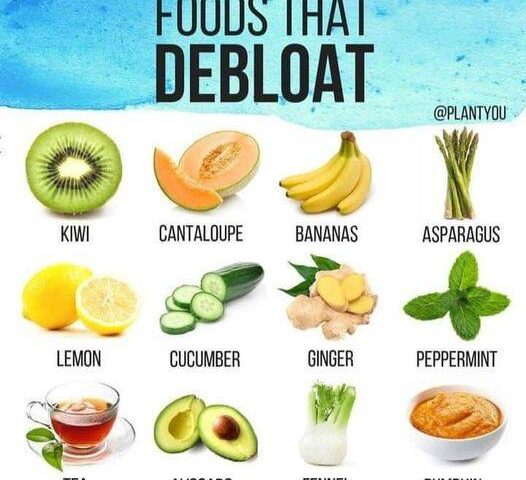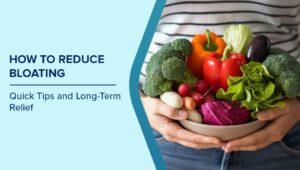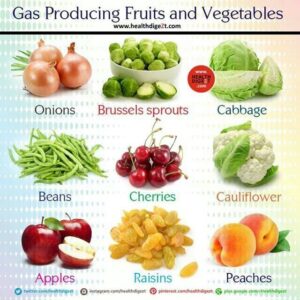Introduction:
Often, we enjoy eating vegetables because they are healthy, fresh, and full of nutrients. We can get vitamins, minerals, and fiber from vegetables that keep us strong. May be some of us notice that after eating certain vegetables, we feel gas and bloating in the stomach. This can make us uncomfortable, heavy, or even in pain.
Often, we forget that some vegetables have natural sugars and fibers that are hard to digest for some people. We can learn simple ways to reduce this problem and still enjoy our favorite vegetables. According to health experts, changing the way we cook, chew, and eat vegetables can make a big difference.
Why Vegetables Cause Gas?
- Often, vegetables like beans, cabbage, broccoli, and onions contain natural fibers and sugars that produce gas and bloating when broken down in the stomach.
- We can have this issue when our digestive system cannot handle certain plant fibers easily.
- May be cooking methods like boiling or steaming help reduce these effects.
Easy Tips to Avoid Gas from Vegetables
- 1. Cook Vegetables Well
Often, cooking vegetables breaks down tough fibers. We can steam, boil, or stir-fry them to make digestion easier.
- Chew Slowly
We can chew vegetables properly to help the stomach digest food better. May be rushing while eating causes more gas and bloating.
https://health.clevelandclinic.org/foods-for-upset-stomach
- Avoid Overeating at Once
Often, eating large portions of vegetables in one meal can cause more gas. We can eat smaller amounts more often.
- Try Soaking Beans before Cooking
We can soak beans for 8–12 hours before cooking. This reduces the sugars that cause gas and bloating.
- Add Herbs and Spices
Often, herbs like ginger, cumin, or fennel help the stomach process vegetables. We can add these to recipes to reduce discomfort.
- Limit Certain Gas-Forming Vegetables
We can reduce broccoli, cabbage, onions, and Brussels sprouts if they cause too much gas. May be we eat them in small amounts instead.
- Drink Warm Water after Meals
Often, warm water helps food move smoothly in the stomach. We can avoid cold drinks right after eating.
8. Avoid Chewing Gum and Drinking Through Straws
We can reduce swallowed air by skipping chewing gum and avoiding straws. Both of these habits cause us to take in extra air, which stays in the stomach and creates bloating.
9. Add Ginger or Mint to Meals
We can add ginger slices to tea or mint leaves to salads and drinks. These natural herbs calm the stomach, improve digestion, and reduce gas formation. Ginger also helps food pass smoothly through the intestines.
10. Soak Beans before Cooking
We can reduce the gas-causing effect of beans by soaking them overnight before cooking. This removes some of the sugars that cause bloating. Adding spices like cumin or fennel while cooking beans also helps digestion.
Effects of Gas and Bloating on Health
- Often, gas and bloating cause discomfort, heaviness, or stomach pain.
- We can feel tired because our body spends more energy digesting food.
- May be long-term gas issues affect our mood and daily life.
- According to doctors, constant bloating can also affect appetite and nutrient absorption.
| Tip | How It Helps | Easy Example |
| Eat slowly | Stops swallowing too much air | Chew food well before swallowing |
| Avoid fizzy drinks | Less gas in the stomach | Skip soda and drink water instead |
| Cook vegetables well | Makes them easier to digest | Steam broccoli instead of eating raw |
| Eat smaller meals | Easier for stomach to handle | Eat 4–5 small meals instead of 2 big ones |
| Limit gas-causing foods | Reduces extra gas | Eat fewer beans, cabbage, and onions |
| Stay active | Helps food move in stomach | Take a short walk after eating |
| Drink warm water | Relaxes stomach muscles | Sip warm water in the morning |
| Avoid chewing gum | Less air goes into stomach | Eat fruit instead of gum |
Simple Daily Habits to Keep Stomach Happy
- Often eat at the same time every day.
- We can walk for 10–15 minutes after meals.
- Avoid lying down immediately after eating.
- May be keeping a food diary to see which vegetables cause gas and bloating for you.
1. Eat Meals at Regular Times
We should try to eat our meals around the same time every day. Our stomach works best when it knows when to expect food. This helps digestion and lowers the chance of gas and bloating.
2. Chew Food Slowly and Well
Often, we rush through meals. We can slow down and chew food properly. This helps break down food early, so the stomach has less work, and we avoid gas.
3. Stay Hydrated
We can drink water throughout the day. Drinking enough water helps digestion and keeps the intestines moving. This prevents gas buildup and bloating.
4. Take Short Walks after Eating
Often, a gentle walk for 10 to 15 minutes after a meal helps move food through our digestive system. This simple habit can reduce gas and bloating.
5. Avoid Lying Down Immediately After Eating
We should wait at least 30 minutes after meals before lying down. Lying down too soon can slow digestion and cause discomfort or gas.
6. Manage Stress
We may feel more stomach problems when stressed. Relaxation techniques like deep breathing, meditation, or listening to music can keep our stomach calm and reduce gas and bloating.
7. Avoid Overeating
Often, eating too much at one time can overwhelm our stomach. We can eat smaller meals or snacks throughout the day to keep digestion smooth.
8. Limit Carbonated Drinks
Fizzy drinks can add extra gas to our stomach. We should replace them with water or herbal teas to keep our stomach happy.
9. Keep a Food Diary
Sometimes, certain foods cause more gas and bloating. We can write down what we eat and how we feel. This helps us find and avoid problem foods.
10. Get Enough Sleep
Often, good sleep helps our whole body, including the stomach, work well. We should try to sleep 7–8 hours every night for better digestion.
FAQs
Q1: Which vegetables cause the most gas?
Often, beans, cabbage, broccoli, onions, and Brussels sprouts cause gas and bloating.
Q2: Can I still eat gas-causing vegetables?
We can eat them in small amounts and cook them well to reduce gas.
Q3: How fast will I feel better if I follow these tips?
Often, results show in a few days, but may be for some people it takes a week.
Q4: Are raw vegetables harder to digest?
According to experts, raw vegetables are harder to digest for some people, leading to gas and bloating.


